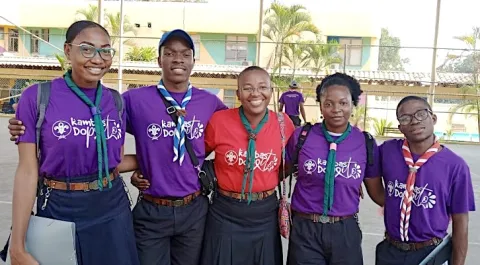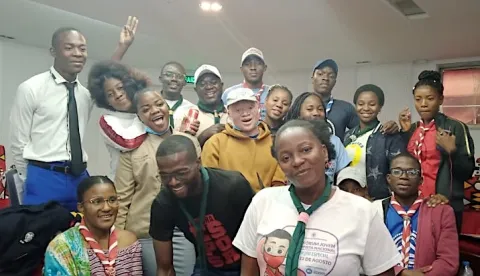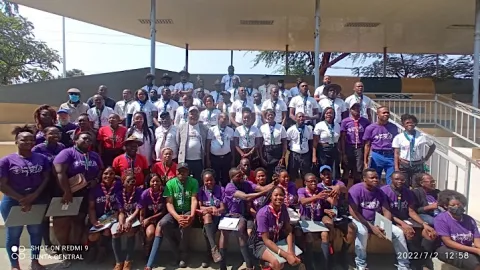Friendship Groups Cascading Sexual and Reproductive Health Education Among Young People in Angola

“Kamba do Peito”, the Portuguese phrase for “Friends of the Heart,” is a sexual and reproductive health education programme by Associação de Escuteiros de Angola seeking to eliminate the transmission of HIV/AIDS and other sexually transmitted infections (STIs) among teenagers and young adults. For those already infected Kamba do Peito is supporting them to improve adherence to antiretroviral therapy and consequent viral suppression. The project is also offering menstrual hygiene resources and support for teenage girls.
Despite lacking external support, this national project currently being implemented in the four provinces of Luanda, Kuanza Sul, Kuanza Norte and Uige is supporting young people to develop and cascade trusted groups of mutually supportive friendships to help them protect themselves and support each other, with great help from volunteer adult leaders.
Through this project, the Scouts of Angola are registering their contributions towards the achievement of SDGs three, five and sixteen on health and well-being, gender equality, and peace, justice, and strong institutions respectively. They are working to end epidemics, ensure universal access to sexual and reproductive health services and rights, end discrimination against all women and girls, eliminate harmful practices, and ensure effective participation and equal opportunities for women, as well as ending abuse, and exploitation against children.

The 2017 National Multiple Health Indicators Survey indicated that in Angola, at least 70% of women report some problem accessing health services, 55% of women have their first birth before the age of 20, sexual abstinence is practiced by only 17% of adolescents, 34% of those under 19 have ever been pregnant or made someone pregnant and, of these, only 24% have given birth. The prevalence of HIV/AIDS in the general adult population is at 2.0%, being 2.6% in women and 1.2 in men.
With these statistics, the Angolan Scouts discovered that, in all this, there is the absence of a sincere arm, a friendly shoulder of reciprocal care. The Scout Method element of small groups called patrols is transformed here into a vital love and friendship patrols.
Initiated in July 2022, Kamba do Peito is expanding young peoples’ knowledge about sexual and reproductive health, prevention of STIs - especially HIV/AIDS, and the community level health structures from which they can get support. Each group member is encouraged to have an up-to-date knowledge of their health status, adopt a healthy lifestyle and be mutually accountable to each other on their sexual and reproductive health issues.
The project is delivered in three stages - Lilac, Red and Green. In the lilac stage, a “Kamba”, (member of the project) recruits five of their friends into the project. Recruitment is an informal, camaraderie process. From free acceptance, each member of the five goes through a training process, with structured themes, but a non-formal method. They are taken through the institutions and people in their community that respond to SRHR and helped to know their health status in relation to STIs and HIV/AIDS. The lead Kamba establishes a follow-up pact with each one in the group. This pact includes ensuring treatment, in necessary situations, or that they do not contract any disease.
In the red stage, each of the five previous Kambas do the same as they were done to. When there is confirmation that each one has managed to recruit their five friends, reaching 25 new ones, the previous Kamba is awarded with an insignia of elder “Kamba.” In the green stage, the second group of Kambas are awarded, when the project reaches 30 members - five in the red phase and 25 in the lilac phase.
Utilizing the waterfall project management model in addressing health issues has enabled the project team to improve young people's participation and to ensure delivery and adherence to ongoing care to realize a significant health impact for the country.
Through this project, Associação de Escuteiros de Angola is playing a critical role in the reduction of pregnancies before age 20, marriages before age 18, and reduced sexual activity among teenagers. They’re also promoting the increased use of contraception by people at risk of unwanted pregnancies, use of skilled antenatal, delivery, and postnatal care, early and effective treatment of STIs and opportunistic diseases, as well as reduced stigmatization and discrimination of people living with HIV/AIDS. It is their dream to see zero contraction and transmission of HIV/AIDS, and zero HIV/AIDS-related deaths among the Kambas and their wider communities.
Looking into the future, Kamba do Peito is banking on the recruitment, training, and monitoring of the Kambas as the basis for self-sustaining the project’s impact. This will however greatly depend on the commitment of the members and external support from stakeholders such as UNAIDS, UNFPA, and the National Institute for the Fight Against AIDS whom they are already in talks with.

-------
Learn more about World Scouting’s Health and Well-being initiative centred on the belief that young people can play a constructive role in society and contribute to healthier and safer environments for everyone. The initiative aims to empower young people by providing them with knowledge, tools and skills related to health and well-being. Participants are able to make informed decisions, take responsibility for their well-being, and actively contribute to the well-being of their communities. By focusing on community-centred projects tailored to the needs of local communities, young people are encouraged to engage with their surroundings and actively make a positive impact.